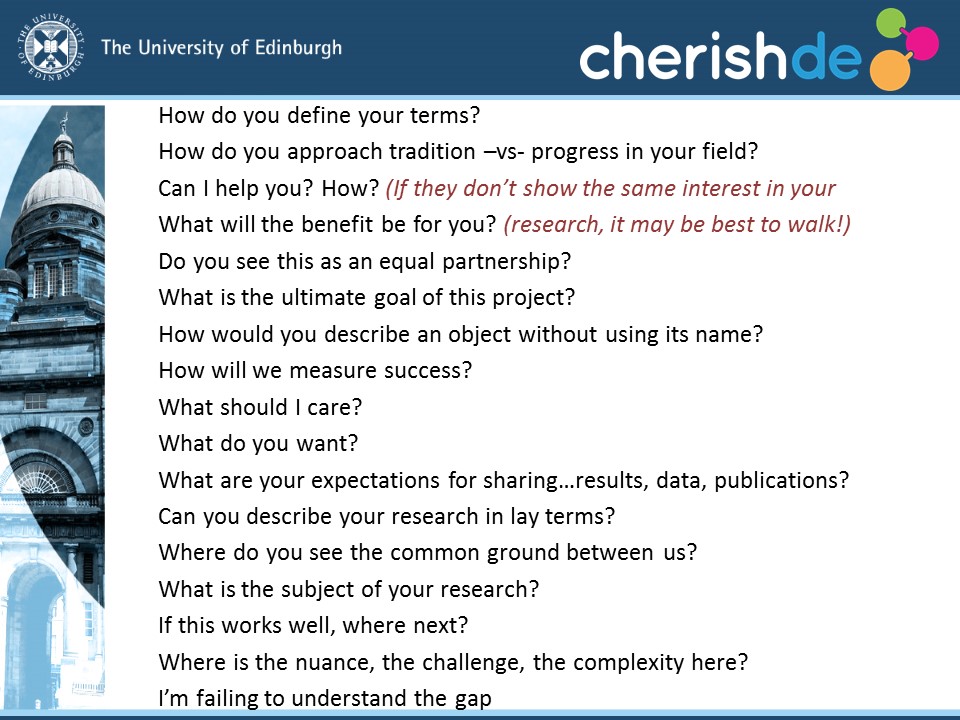
Last week I was involved in two events which on the surface looked different, but actually covered some very similar themes. The first was the launch of a new PhD supervisors’ network here at Edinburgh. This is part of the Supervision workstream of the Excellence in Doctoral Education and Career Development Programme and was a chance for us (principally my colleague Dr Fiona Philippi, Head of Doctoral Education who leads the project) to share some initial ideas and ask the supervisors present how they would like the network to operate.
As part of the discussion, Fiona illustrated an example of the resources available to support supervision by sharing a version of the Griffith University Expectations in Supervision questionnaire. I’ve used this for many years in PhD induction and “getting started” events so it was interesting to see the reaction of supervisors to the tool which is a series of paired statements which demonstrate the dichotomies possible in PhD supervision. The response was very positive, with all those present seeing the value in having a tool to prompt discussion but also clarify the details of their supervisory approach. No one wants to impose a single, cookie-cutter model on doctoral supervision as the questionnaire demonstrates. People talked about the value the discussions would have to students coming to the UK for their PhDs as it might uncover any assumptions they might have. Most importantly, used well, the discussion will reduce uncertainty and the resulting anxiety for students.
During more detailed discussions, the topic of co-supervision emerged as a key area which needed more scrutiny so we are planning to develop the questionnaire further to help students and supervisory teams work together with more transparency and clearer responsibilities.
Co-supervision is now pretty universal at Edinburgh, both as a means of quality assurance but also often reflecting the multi- and inter-disciplinary nature of many PhD projects. This links us to the second event of the week – the Digital Economy Crucible. I was a speaker at the second Crucible “lab” in Edinburgh last week and decided to speak on the topic of Confusion in Collaboration. This is a interesting idea to explore but I can’t take the credit for the idea which came from Professor Barry Smith at Welsh Crucible when he spoke about the steps to really effective collaboration as being Contact, Communication, Confusion and Conflict.
Barry was one of three “heroes” of collaboration I mentioned in my talk, the others being Professor Catherine Lyall from Edinburgh who’s established a deep understanding of models of collaboration as well as producing a series of incredibly useful practical guides to help people in the interdisciplinary space work more effectively.
Catherine was the “critical friend” for a guide to collaboration I wrote for the Institute of Physics in 2015 which featured my last hero, Professor Tom McLeish. Tom is a physicist so has had a career collaborating with with other scientists in academia and industry, but in recent years has worked within the Durham Institute for Medieval and Renaissance Studies (IMRS) reexamining scientific thinking in the 12th-14th centuries on The Ordered Universe project. A collaborative close reading of works by teams of medieval scholars and scientists is generating new insights into the vital but overlooked foundations of modern science.
The slides from my talk are below, but the key activity in my slot was to get the Cruciblists to talk to someone from another discipline about the assumptions that people made about their discipline or area. Some fascinating conversations followed but I moved them promptly on to try to come up with some new questions to reduce confusion. Their list complements one that was produced by a Stirling Crucible group a few years ago which I blogged about in a former life (Confusion in Collaboration).
Confusion in Collaboration <- The Slides
The questions generated by the group:

My final act was to share the Griffith questionnaire with this group as a final test of their understanding of each other’s research models.
What questions could help you avoid future conflict and bring confusion to the surface?


[…] the theme of Science and Culture. Barry’s insights have subsquently inspired me to develop a workshop on this theme which I’ve run repeatedly. Although Barry’s talk stands out for me as we are talking […]